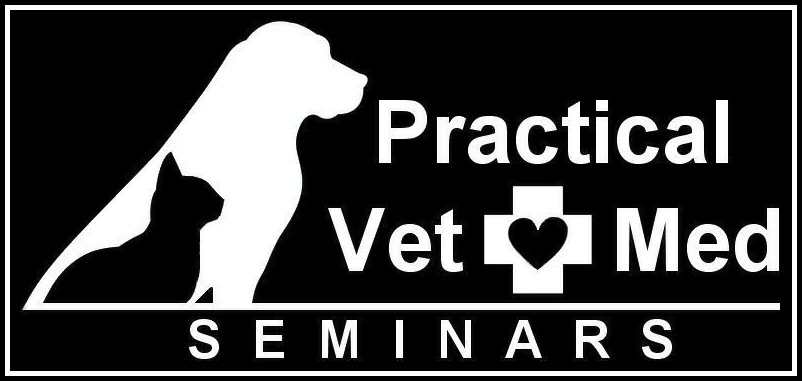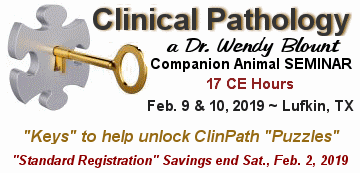| |
Dr. Wendy Blount invites you to one of her newest seminar subjects. Here's part of what will be
available for you to experience:
During the 2 Days and 17 CE Seminar Hours , each of the common
first tier blood tests will be discussed in detail, and a list of differential diagnoses created
for each.
Also covered will be a system to work through these
diagnoses in a logical manner to arrive at the correct diagnoses, for optimum health
care benefits.
The most commonly indicated outside lab tests for the problems we see most
often in the trenches of small animal practice will be discussed, considering when to use these tests,
how to collect and ship test samples, and where to send them.
Cases will be introduced all throughout this seminar as real examples of how lab tests made all the
difference to a successful healthcare outcome.
Included in your proceedings will be all PowerPoint presentations, client handouts on tests we
discuss (explains why we recommend a particular test), diagnostic aid charts and algorithms, and
much more.
During this seminar you'll also learn the answers to these important questions:
Why it is of utmost importance to look at the blood
smear of any patient with an abnormal CBC? What parasites and protozoa might you see there? What
can the red blood cells, white blood cells and platelets tell you about your patient? How do you
quickly estimate the cell counts to check your CBC controls?
How do you best assess the anemic patient?
Is the anemia severe enough to be a primary problem, or should
we work on other problems first? Why is it so crucial to get a reticulocyte count when assessing
the anemic patient?
How do you use platelet count, buccal mucosal bleeding time and ACT with minimal
equipment in any practice to work up bruising/bleeding problems? If you have PT and
PTT in house, we will discuss using those tests to their best advantage as well. For those who
do not have in house equipment for PT and PTT, we will discuss the best options for sending those
tests out.
How to put urinalysis to work for you and your
patient? Urinalysis is probably the most underutilized first tier lab test in small
animal medicine. It requires no expensive equipment and the cost to the clinic is minimal. We cannot treat azotemia and number of other conditions intelligently without it.
This seminar will also teach you how to get the most benefit from using outside labs:
Endocrine testing in detail: for
example, which is better, ACTH Stim or Low Dose Dex? Which of the many thyroid panels should
we choose, and under what circumstances? Can we use A1c testing effectively for dogs and cats?
the latest in PCR and DNA testing:
this will cover testing for the many genetic diseases, for infectious disease and for breeding.
tests for gastrointestinal disease:
TLI, PLI, B12, folate, Dysbiosis Index, diarrhea pathogen panels, alpha 1 fecal proteinase, FISH
analysis, etc.
the latest cardiac blood tests: troponin,
ProBNT, etc.
Colorado State tests for sorting out those elusive
lymphoma cases: PARR, flow cytometery, immunocytochemistry, etc.
the most up to date diagnostic and treatment aids for
fungal disease: from Pan American Vet Lab and Mira Vista Lab.
neuromuscular tests: available at
UC Davis.
~~~~~~~~~~
Comments from attendees of this seminar:
- Awesome! Thank you. Will be back.
Questions???
Contact Russ
phone: (936) 564-7792 e-mail: russ@vonallmen.net
Seminar approved by TBVME
(Texas Board of Veterinary Medical Examiners)
17 Hour Units for Veterinary CE in Texas
(NOTE: Other states may be added on request
with sufficient notice)
Seminar presented by:

|
|

